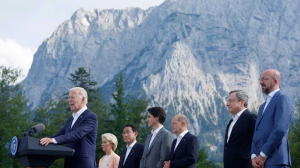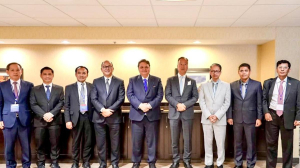US EXIM Bank approves US$99.7 million loan for Balikpapan refinery project
Published on 16/05/2023 at 10:41 GMT+7 Reading time
US EXIM Bank has finally granted loan disbursement worth US$99.7 million for the Refinery Development Master Plan (RDMP) operated by Pertamina subsidiary PT Kilang Pertamina Balikpapan.
The president director of EXIM Bank Reta Jo Lewis, stated that the Balikpapan refinery project can reduce Indonesia's dependence on fuel imports. Additionally, the project can also enhance fuel standards to be cleaner and more environmentally friendly.
"The loan will allow Indonesia to significantly reduce its reliance on fuel imports while upgrading to cleaner standards," Reta Jo said in a written statement.
The project underwent a comprehensive feasibility review with US EXIM Bank's environmental and social due diligence procedures and guidelines, which Pertamina is required to adhere to during the transaction.
It is worth noting that the loan will be utilized to enhance the gasoline production of the Balikpapan refinery to 101,000 barrels per day.
According to a government notice, the proposed US$99.7 million loan would also support the export of roughly US$63.9 million in US equipment and services to upgrade and expand the refinery.
Draws criticism from US President and environmental organisations
Previously, US EXIM Bank had reportedly retracted its intention to disburse the US$99.7 million loan following protests from environmental organizations. They argued that approving the financing would be incongruent with US President Joe Biden’s dedication to fighting climate change.
The board of directors at US EXIM Bank had initially scheduled a vote on April 27 to determine the loan for the Balikpapan refinery project, but the plan was eventually removed from the agenda.
Hence, following the approval of the loan by the US EXIM Bank, various environmental organizations including President Joe Biden once again voiced criticism towards the decision.
Moreover, the approval of the Balikpapan refinery financing was also set up just as Biden was preparing to attend the G7 Summit in Hiroshima, Japan, on May 19, 2023.
US EXIM Bank approval was seen as inconsistent with the US Government’s policies because the bank is an agency under the US Federal Government, which should have policies aligned with the Biden Administration.
It is worth noting that in an executive order issued during his first week in the White House, Biden vowed to curb public funding of foreign fossil fuels. In the 2021 UN Climate Summit, he also signed a pledge with 33 other countries to halt direct public support for unabated international fossil fuel projects.
The spokesperson for the US National Security Council Adam Hodge stated that the decision by the US EXIM Bank represents the first commitment to fossil fuel financing by the US since Biden assumed the presidency in 2021.
“EXIM Bank made an independent decision to approve the loan within its authority, and its decision does not reflect government policy,” Adam said.
Funding and financial institution involved in Balikpapan refinery
Pertamina Balikpapan refinery had projected to sign the financial close of the Balikpapan RDMP project in East Kalimantan in March. The total funding needed for the project is US$3.1 billion, consisting of loans from global financial institutions of US$2.3 billion and US$800 million from domestic and foreign commercial banks.
The financing for the Balikpapan refinery project involves global financial institutions from three countries, including two financial institutions from South Korea and one financial institution each from the US and Italy.
As part of the National Strategic Projects (PSN), the Balikpapan RDMP project has been designed to enhance the capacity and processing capabilities of the refinery.
The current installed capacity of Refinery Unit V Balikpapan is only 260,000 barrels of oil per day (BOPD) and with the RDMP project, the installed capacity of the Balikpapan Refinery will increase by 100,000 BOPD to 360,000 BOPD.
Already have an account? Sign In
-
Start reading
Freemium
-
Monthly Subscription
30% OFF$26.03
$37.19/MonthCancel anytime
This offer is open to all new subscribers!
Subscribe now -
Yearly Subscription
33% OFF$228.13
$340.5/YearCancel anytime
This offer is open to all new subscribers!
Subscribe now






